Hanoi achieves 2024 socioeconomic goals, sets sights on new ambitions
On December 4, at the 20th conference of Hanoi Party Committee's 17th Executive Committee, Vice Chairman of Hanoi People's Committee Ha Minh Hai delivered a comprehensive report on the city's socioeconomic development performance in 2024 and strategic development plan for 2025.
The 2024 socioeconomic development plan has been essentially completed, and the only indicator facing challenges is the public transport passenger ratio.
The capital's economy has posted higher growth than last year. The regional GDP for the first nine months increased by 6.12 per cent, exceeding the 5.99 per cent growth recorded in 2023, with a projected year-end growth of around 6.5 per cent, surpassing the 6.27 per cent posted the previous year.
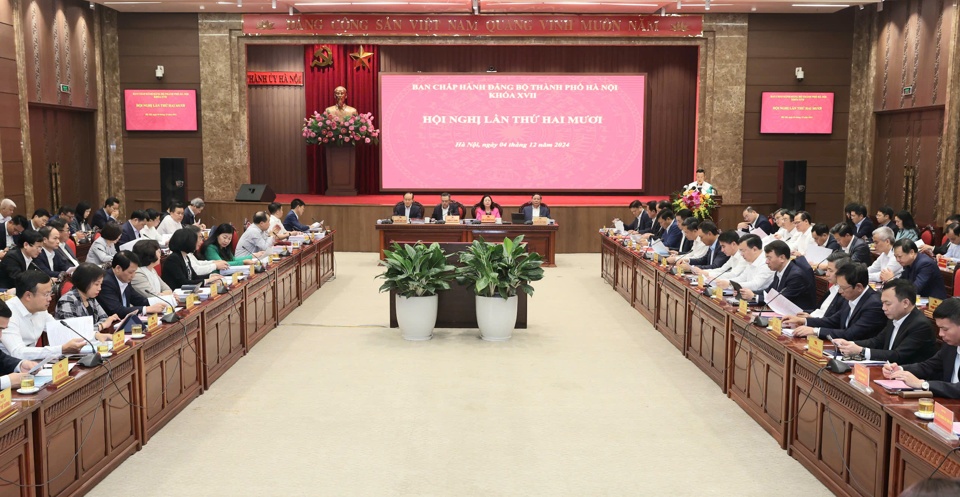 |
| Overview of the conference |
Export turnover recovered strongly, reaching $15.4 billion in the first 10 months of 2024, a 12.3 per cent increase from the previous year, and is expected to surpass the annual target. Import turnover totalled $33.2 billion, up 9.6 per cent, with projections also exceeding the plan. The consumer price index rose above both the same period and the annual target, averaging 4.61 per cent compared to 1.51 per cent last year, with efforts focused on keeping the consumer price index (CPI) under 4 per cent for the year.
Public investment in 2024 was set at $3.03 billion, a 1.64-fold increase from 2023. By November 30, disbursement had exceeded $1.57 billion, or 52.4 per cent of the plan, while $1.44 billion, equivalent to 47.6 per cent, remains to be allocated in the final months. Hanoi People's Committee has directed units to prioritise critical tasks through January 2025, striving to ensure successful public investment disbursement.
Major balances were maintained, with effective resource mobilisation and strong socioeconomic development. State budget revenue is projected at $19.37 billion, achieving 120.5 per cent of the estimate and a 19.6 per cent increase from 2023. Local budget expenditure is estimated at $4.98 billion, reaching 86.4 per cent of the year's initial plan.
The city has prioritised transportation infrastructure, completing and operating the elevated section of urban railway line 3, from Nhon to Hanoi station, and finishing the Au Co road project from Thang Loi Hotel to Nhat Tan bridge.
Additionally, anti-corruption efforts were strengthened, with a review of 712 delayed projects causing resource waste. Hanoi is the first locality to establish a steering committee for implementing anti-waste measures.
Cultural and social sectors continued to receive attention, with Hanoi actively implementing investment plans in education, healthcare, and heritage restoration. Cultural, sports, and festival activities also developed strongly. The 70th anniversary of the liberation of the Capital celebrations attracted numerous domestic and international tourists.
The city created jobs for over 196,000 workers, achieving 118.9 per cent of the annual plan, with a focus on fully implementing policies for those with revolutionary contributions, allocating over $78.7 million. The city also completed housing construction and repair plans for 714 poor and near-poor households.
Vice Chairman Hai said, “Alongside achievements, there are some existing limitations, such as uneven staff capabilities, limited working methods and awareness among some officials, lack of dynamism and creativity, and low sense of responsibility with instances of shirking administrative duties. Some regulations remain incomplete, particularly coordination mechanisms, while procedures are not yet streamlined, and administrative procedure restructuring remains slow and formalistic.”
Agreeing with these observations, Nguyen Xuan Linh, secretary of Hoang Mai district Party Committee, stated, "There are many things we need to review. The decentralisation process, progress, and content have areas where, after decentralisation, handover processes are very slow, preventing effective delegation to grassroots levels."
Major goals in 2025
With the successes of 2024, and entering 2025, Hai stated that the city will continue to deeply comprehend the guidance of Party General Secretary To Lam in understanding and acting on the new era, the era of Vietnam's national emergence.
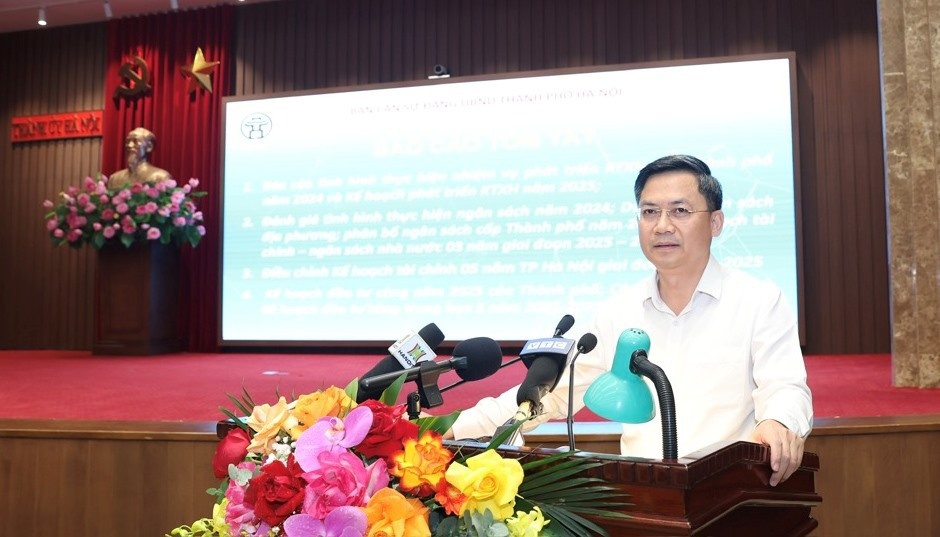 |
| Vice Chairman of Hanoi People's Committee Ha Minh Hai |
Hanoi will implement the amended Capital Law, the 2021-2030 capital planning with a vision to 2050, and the adjusted general planning to 2045 with a vision to 2065. The city will develop policies for accelerated, breakthrough growth in 2025 and 2026-2030, focusing on socioeconomic plans, public investment, and sectoral programmes aligned with new global perspective, new capital city thinking, and Hanoi action.
The city will establish 25 indicators, including five economic, 14 socio-cultural, and five urban-environmental indicators, with added focus on social housing. It is committed to achieving socioeconomic goals for 2021-2025, advancing administrative reform, streamlining structures, enhancing discipline, combating corruption, promoting science and technology, and driving three key transformations encompassing digital, green, and energy transformation.
For 2025, Hanoi targets state budget revenue of $19.8 billion, a 2.7 per cent increase from 2024, and local revenue exceeding $6.53 billion. Key indicators include regional GDP growth of at least 6.5 per cent, per capita regional GDP of $6,781 or higher, investment growth of 10.5 per cent, export turnover up by 5 per cent, inflation below 4.5 per cent, and poverty eradication by year-end.
The vice chairman has outlined three growth scenarios, with the first targeting regional GDP growth of 6 to 6.5 per cent, the second aiming for baseline growth between 6.5 and 7.5 per cent, and the third projecting high growth exceeding 8 per cent.
To achieve these objectives, Hanoi has outlined 10 key tasks and solutions, focusing on economic development, growth targets, inflation control, and addressing major economic balances. This includes reviewing investment projects, resolving business challenges, and attracting investment to the capital.
"We must ensure a consistent spirit of innovation and creativity. The most critical factor is the role of leadership at all levels, which will determine whether we achieve our goals and aspirations. Secondly, we must quickly focus on developing and issuing specific institutional documents to implement the Capital Law, and research breakthrough mechanisms to unlock resources," Hai emphasised.
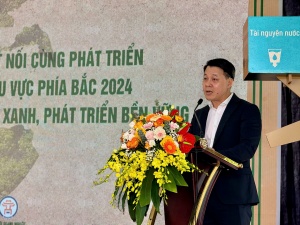 | Hanoi sets dual path through green and digital transformation Green and digital transformation are becoming dual drivers of growth for Hanoi, paving the way for the city’s modern and sustainable development. |
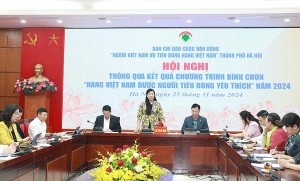 | Hanoi to announce top 150 products and services in 2024 One hundred fifty products and services selected by consumers will be honoured at the "Vietnamese Goods Favoured by Consumers" awards in 2024. |
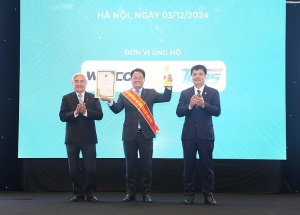 | Hanoi’s smart city initiatives claims top awards Hanoi has for the first time won awards for smart infrastructure and smart public services at the Vietnam Smart City Awards, demonstrating its significant strides in digital transformation and urban innovation. |
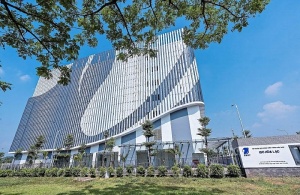 | Hanoi set to launch city's main data centre The inauguration ceremony for Hanoi's main data centre will take place on December 6 at VNPT IDC Hoa Lac, part of VNPT Group, located in Hoa Lac High-Tech Park. |
What the stars mean:
★ Poor ★ ★ Promising ★★★ Good ★★★★ Very good ★★★★★ Exceptional
Related Contents
Latest News
More News
- Digital publishing emerges as key growth driver in Vietnam (January 30, 2026 | 10:59)
- EVN signs key contract for Tri An hydropower expansion (January 30, 2026 | 10:57)
- Vietnam to lead trade growth in ASEAN (January 29, 2026 | 15:08)
- Carlsberg Vietnam delivers Lunar New Year support in central region (January 28, 2026 | 17:19)
- TikTok penalised $35,000 in Vietnam for consumer protection violations (January 28, 2026 | 17:15)
- Digital economy takes centre stage in Vietnam’s new growth model (January 28, 2026 | 11:43)
- EU Council president to visit Vietnam amid partnership upgrade (January 28, 2026 | 11:00)
- Vietnam entering a new growth phase in 2026 (January 28, 2026 | 10:02)
- VIMC targets higher profit and throughput in 2026 (January 26, 2026 | 19:00)
- GEVA a launchpad for Vietnam’s agricultural exports (January 26, 2026 | 12:03)

 Tag:
Tag:




















 Mobile Version
Mobile Version